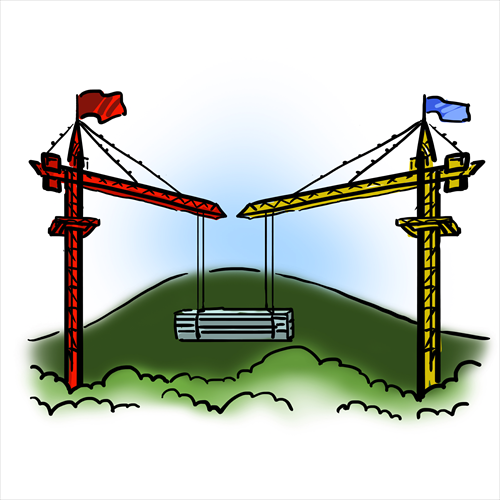Great power competition good for emerging continent

Illustration: Liu Rui/GT
The George Walker Bush Highway running through Accra, Ghana, connects the US and China in Africa. The bridge was financed by the Millennium Challenge Corporation, a US aid agency, and used a Chinese construction firm as one of two main contractors. This is not an isolated example of cooperation; also in Ghana, the Export-Import Bank of China and the Export-Import Bank of the US are co-financing a dam.
Talking about cooperation goes against the grain in the backdrop of the recent summit between US President Obama and more than 40 African leaders in Washington. Some see the summit as a further spur to competition between China and the US in Africa.
There are echoes of the Cold War, when China, the US, and Soviet Union competed for influence in Africa. But the uglier side of the Cold War was support by outside powers that provoked or prolonged war.
In this new geopolitical rivalry, both China and the US wish to be Africans' predominant partner. However, rather than Cold War proxy conflict, there is a focus on trade and development.
The signature program announced by Obama during his tour of Africa in 2013 was Power Africa, launched with $7 billion to finance US electrical equipment for African countries. This initiative is going head-to-head with China's low-cost loans to Africa, contracting Chinese engineering firms to build power and transportation infrastructure.
There are far more homes in Africa in need of electricity than can be electrified even through the combination of these rival programs. The result then is not one country trumping the other, but a surge in funds for expanding the African grid.
It is the healthiest kind of competition, with opposing efforts coalescing into a virtuous circle of flourishing trade that benefits Africa as well as China and the US.
This isn't the Cold War. Even military relations can be complementary. General Carter Ham, former head of US Africa Command from 2009 to 2012, has observed that in assistance to African militaries, China provides the hardware while the US handles the software.
In a speech, he cited an example of the purchase of river patrol boats by the Democratic Republic of Congo from China. US personnel will train Congolese sailors to use the Chinese boats. He gave another example of a Chinese-built Tanzanian military headquarters to be filled with US-produced curriculum. It's refreshing to see this perspective on synergy from the former top US general in the region.
Competition means that new ideas can be tried out or old ones revived. Before the rise of Sino-African engagement, first world donors had begun to turn away from building infrastructure or providing university scholarship to promising African students. China has renewed these old ideas as the main features of its aid.
There are now 12,000 African students in China on official scholarships, a higher number of grants to Africans students than provided by the US government, despite a prominent announcement expanding the Mandela Washington Fellowships planned at the summit. Chinese roads, bridges, stadiums and even opera houses are landmarks across Africa.
Feeling left behind by China's more visible infrastructure footprint, first world donors including the US have also increased road building. The result has been a team of rivals, most spectacularly demonstrated in one major African road project.
While China is funding two road segments in Kenya, the EU is separately providing aid to build an adjacent segment. And Japan is financing a fourth physically unconnected road in Tanzania - the culmination of this piecemeal work by diplomatic competitors, to be finished two years hence, will be the creation of a continuous 10,200-kilometer road stretching from Cape Town to Cairo.
Meanwhile, the US has built a segment in South Sudan that is one segment of an alternative Cape-to-Cairo route.
These sponsors competing to advance their national interests have come into alignment by helping create the first pan-African highway.
Whether as competitors or partners, engagement by China and the US in Africa will be complementary. The result is greater development and trade, a common goal that makes one wonder why competition doesn't give way to cooperation more often.
The author is a corporate lawyer in Beijing advising Chinese clients on investments in Africa. opinion@globaltimes.com.cn